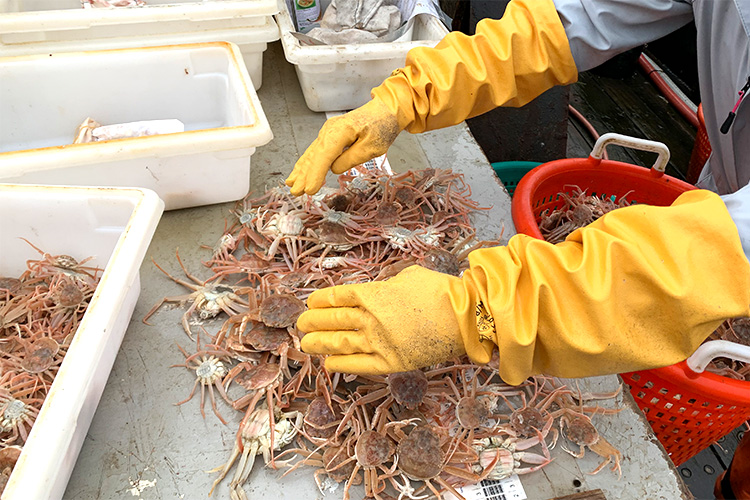Alaska’s snow crabs have suffered a population collapse in recent years, with numbers declining by a shocking 10 billion between 2018 and 2021, and more losses are set to come. In a new study, scientists looked into the mass mortality event and concluded that it was over 98 percent likely to have been caused by humans.
Researchers from NOAA Fisheries found the abrupt collapse of snow crabs (Chionoecetes opilio) in the Bering Sea was a direct consequence of human-caused climate change causing an ecological shift from Arctic to sub-Arctic conditions in the southeastern Bering Sea.
Snow crabs are a cold-adapted species that are brilliantly adapted to live in chilly Arctic conditions. Young crabs mature in “cold pools,” a layer of water that’s less than 2°C (35.6°F) located on the seabed left behind by melting sea ice. The layer of near-frozen water acts as a barrier against predators, allowing the juvenile crabs to develop in peace.
However, these cold pools are quickly shrinking, putting a huge strain on the population. Warming temperatures are causing their environment to undergo a process of borealization, a shift from Arctic conditions to boreal conditions typically seen in northern regions with coniferous forests.
“What is particularly noteworthy is these boreal conditions associated with the snow crab collapse are more than 200 times likely to occur in the present climate (1.0°–1.5° of warming rate) [1.8-2.7°F] than in the preindustrial era,” Mike Litzow, lead author and director of the Alaska Fisheries Science Center’s Kodiak Lab, said in a statement.
“Even more concerning is that Arctic conditions conducive for snow crabs to retain their dominant role in the southeastern Bering Sea are expected to continue to decline in the future,” said Litzow.

Scientist sorting through snow crab on the NOAA eastern Bering Sea bottom trawl survey.
Image credit: NOAA Fisheries
The extent of the decline was highlighted by a study last year that found the population of snow crabs had declined by around 10 billion between 2018 and 2021 following a string of marine heatwaves. With further warming expected in the next few decades, it’s likely that snow crab stocks will continue to suffer.
The new research claims that this sharp decline was closely associated with higher summer temperatures around the seabed, a sure sign that the crab’s vital cold pools are diminishing. They also found an increase in the abundance of a key predator (the Pacific cod) and bitter crab disease, both of which respond positively to ocean warming.
The snow crabs aren’t being “cooked alive,” as such. Thermal shock doesn’t directly appear to be a major factor in the collapse. Although warmer temperatures may be impacting their metabolism, lab tests show that juvenile snow crabs are relatively unaffected by temperatures of up to 8°C (46.4°F).
Nevertheless, it’s evident that the crabs are being impacted by the warming temperatures via the dramatic effect it’s having on their fragile ecosystem.
“It’s really this combination of factors working together that caused the snow crab collapse,” said Litzow.
“All of these factors are a result of climate change brought about by human activity since the start of the Industrial Revolution in the early 1900s. They indicate a wholesale transition towards boreal conditions in the southeast Bering Sea during these warm years,” he added.
The study is published in the journal Nature Climate Change.
Source Link: Mystery Of 10 Billion Snow Crabs Dying In Alaska Solved: Humans To Blame